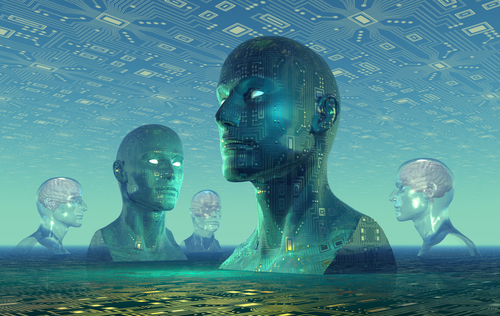
"In sorting priorities, I adopt what I term the central principle of cultural evolution, which I refer to as the Intelligence Principle: the maintenance, improvement and perpetuation of knowledge and intelligence is the central driving force of cultural evolution, and that to the extent intelligence can be improved, it will be improved." -- Stephen J. Dick
Transhumanists are in the business of speculating about the degree to which we can and will refine the human species. A central assumption among us is that there's significant potential for the re-engineering of humanity; in modern practice we have scarcely begun to scratch the surface, but our visions of what may be possible in terms of modification and enhancement is startlingly vast.
Indeed, for most transhumanists, the notion that the human species is forever destined to remain a purely biological entity is both absurd and facile. Taking a step back, can we seriously argue that the apex of intelligent life is the state at which it was last crafted by the processes of natural selection? Given the current developmental state of biotechnology, cybernetics and information technologies, combined with the potential for molecular nanotechnology, can we reasonably refrain from suggesting that humanity is poised to under go a transformation that will be nothing short of radical and profound?
And this isn't some airy-fairy gee-whiz futurism talking, either. Rather, it's a fair assessment of where we are at as self-modifying species that has yet to meaningfully integrate technology with biology.
Take a step back and look at the big pictureFor the dissenters and skeptics, what often gets lost in the discussion is the '40 foot perspective.' Discussions often regress to cultural/ethical/moral inhibitions, yuck factor ethics, and sheer incredulousness; it's hard for many of us to imagine anything other than our current state of being.
But this isn't good enough. We need to start thinking more philosophically and broadly about the potential for intelligent life and the impacts that will come through steady technological progress.
To assume, for example, that our current social, scientific, technological and biological condition is at or near an end-state is in its own way a violation of the Copernican Principle; it would be folly to assume that we observe ourselves at a particularly special point in history -- especially when it appears that our rate of progress is accelerating. Instead, we should apply a developmental view to our situation and acknowledge the fact that we still have a huge space of possibilities to work within.
The 'Intelligence Principle'A similar sentiment was articulated by the distinguished historian of science Stephen J. Dick, in his 2003 paper "
Cultural Evolution, the Postbiological Universe and SETI," where he argued that there is a disconnect between much of our current thinking and the prospects following exponential growth of technology as perceived in recent times. Dick's critique was primarily directed at SETI, but it's one that can applied to those who are complacent about our current existential mode.
In his paper, Dick makes the case that we may become (or spawn) a postbiological species, one that has "evolved beyond flesh and blood intelligence to artificial intelligence" and is a "product of
cultural rather than biological evolution." He believes that this possibility hasn't been given the attention it's due, nor has it been carried to its logical conclusion. Consequently, Dick argues that we need to apply more long-term thinking when contemplating the problem of our future and that of intelligence in the universe.
To that end, Dick suggests that we apply the 'Intelligence Principle' (quoted above) to our long-term thinking about humanity's potential. His central contention is that we should readjust our thinking and consider a postbiological universe -- an argument powered by the likely age and lifetimes of technological civilizations and the overriding importance of cultural evolution as an element of cosmic evolution.
A will and a way And it's important to note that the timelines don't matter (well, they do matter, but let's set that aside for the moment). A significant number of people dismiss transhumanists on account of our overly optimistic time frames. For the sake of argument let's assume that technological progress continues to plod along at a linear rate. Well, that's still progress: given enough time, incentive and access to resources, there's no reason to believe that humanity cannot come to realize many of the futuristic visions espoused by the transhumanists. As long as something is scientifically viable, and there's a perceived need for it, it will be developed.
This the crux of the intelligence principle:
"...to the extent intelligence can be improved, it will be improved."
And overcoming the limitations of human biology would certain seem to be on the agenda. Among other things, the transhumanist 'to do list' typically includes the eradication of infirmity, aging, and suffering. We don't imply that solving these problems is going to be easy, but we do suggest that these problems are not intractable.
There is a will, and there will be a way.
 Slowly but surely, SETI is starting to get the picture: If we're going to find life out there—and that's a big if—it's probably not going to be biological. Writing in Acta Astronautica, SETI's Seth Shostak says that the odds likely favour detecting machine intelligences rather than "biological" life.
Slowly but surely, SETI is starting to get the picture: If we're going to find life out there—and that's a big if—it's probably not going to be biological. Writing in Acta Astronautica, SETI's Seth Shostak says that the odds likely favour detecting machine intelligences rather than "biological" life. 


